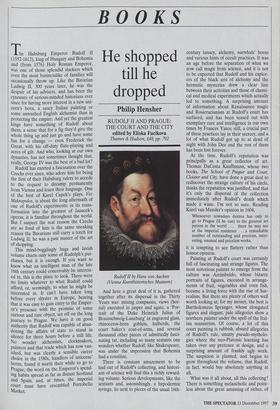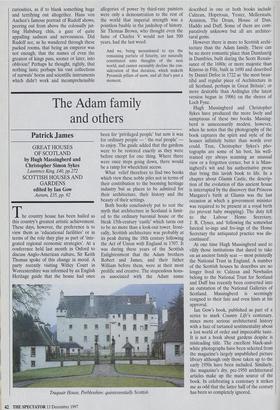BOOKS
He shopped till he dropped
Philip Hensher
RUDOLF II AND PRAGUE: THE COURT AND THE CITY edited by Eliska Fucikova Thames & Hudson, £48, pp. 792 The Habsburg Emperor Rudolf II (1552-1612), king of Hungary and Bohemia and (from 1576) Holy Roman Emperor, was one of those splendid slackers which even the most businesslike of families will occasionally throw up. Like the Bavarian Ludwig II, 300 years later, he was the despair of his advisers, and has been the cynosure of serious-minded historians ever since for having more interest in a new uni- corn's horn, a saucy Italian painting or some unwashed English alchemist than in protecting the empire. And yet the greatest kings have something of Rudolf about them, a sense that for a fig they'd give the whole thing up and just go and have some fun for a change — even Frederick the Great, with his off-duty flute-playing and acres of gilt. And who, looking at our own dynasties, has not sometimes thought that, really, George IV was the best of a bad lot?
Rudolf has exerted a fascination over the Czechs ever since, who adore him for being the first of their Habsburg rulers to accede to the request to decamp permanently from Vienna and learn their language. One of the best of Karel Capek's plays, Vec Malcropulos, is about the long aftermath of one of Rudolf s experiments; in its trans- formation into the greatest of Janacek's operas, it is familiar throughout the world. But I suspect the real reason the Czechs are so fond of him is the same sneaking reason the Bavarians still carry a torch for Ludwig II; he was a past master of the art of shopping. This mind-bogglingly huge and lavish volume charts only some of Rudolph's pur- chases, but it is enough. If you want to know what an intelligent man of the late 16th century could conceivably be interest- ed in, this is the place to look. There were no limits whatever to what Rudolf could afford, or, seemingly, to what he might be interested in. It can't have taken long before every shyster in Europe, hearing that it was easy to gain entry to the Emper- or's presence with the promise of some curious and rare object, set off on the long journey to Prague. We have it on good authority that Rudolf was capable of aban- doning the affairs of state to stand in Silence for three hours before a still life. No wonder alchemists, clockmakers, painters and that trade which has now van- ished, but was clearly a sensible career choice in the 1580s, handlers of unicorns' horns, found it worth their while to go to Prague; the word on the Emperor's spend- ing habits spread as far as distant Scotland and Spain, and, at times, the imperial court must have resembled Portobello Market.
Rudolf H by Hans von Aachen (Vienna Kunsthistorisches Museum)
And here a great deal of it is, gathered together after its dispersal in the Thirty Years war: mining compasses, views (hor- rid) executed in jasper and agate, a 'Por- trait of the Duke Heinrich Julius of Braunschweig-Luneburg' in engraved glass, rhinoceros-horn goblets, halberds, the court baker's coat-of-arms, and several thousand other pieces of admittedly fasci- nating tat, including so many sextants one wonders whether Rudolf, like Shakespeare, was under the impression that Bohemia had a coastline.
There is constant amazement to be had out of Rudolf s collecting, and histori- ans of science will find this a richly reward- ing volume. Serious developments, like the sextants and, astonishingly, a hypodermic syringe, lie next to pieces of the usual 16th- century lunacy, alchemy, narwhals' horns and various hints of occult practices. It was an age before the separation of what we now call magic from science, and it is not to be expected that Rudolf and his explor- ers of the black arts of alchemy and the hermetic mysteries drew a clear line between their activities and those of chemi- cal and medical experiments which actually led to something. A surprising amount of information about Renaissance magic and Rosicrucianism at Rudolf s court has surfaced, and has been teased out with exemplary care and intelligence in our own times by Frances Yates; still, a crucial part of these practices lay in their secrecy, and a lot of what Rudolf got up to at dead of night with John Dee and the rest of them has been lost forever.
At the time, Rudolf s reputation was principally as a great collector of art. Thomas DaCosta Kauffmann, whose two books, The School of Prague and Court, Cloister and City, have done a great deal to rediscover the strange culture of his circle, thinks the reputation was justified, and that it's only the dispersal of the collection immediately after Rudolf s death which made it wane. I'm not so sure. Reading Karel van Mander's opinion in 1604, Whosoever nowadays desires has only to go to Prague (if he can) to the greatest art patron in the world . . . there he may see at the imperial residence . . a remarkable number of outstanding and precious, inter- esting, unusual and priceless works, it is tempting to see flattery rather than honest opinion.
Painting at Rudolf's court was certainly full of fascinating and strange figures. The most notorious painter to emerge from the culture was Arcimboldo, whose bizarre portraits of figures, executed in arrange- ments of fruit, vegetables and even fish, became a living force with the rise of Sur- realism. But there are plenty of others well worth looking at; for my money, the best is Bartholomeus Spranger, whose elongated figures and elegant, pale allegories show a northern painter under the spell of the Ital- ian mannerists. Of course, a lot of this court painting is rubbish, absurd allegories of Rudolf s rule, smutty pseudo-mytholo- gies where the neo-Platonic learning has taken over any pretence at design, and a surprising amount of frankly ugly work. The suspicion is planted, and begins to grow throughout the volume, that Rudolf, in fact, would buy absolutely anything at all.
What was it all about, all this collecting? There is something melancholic and point- less about the great amassing of riches, of curiosities, as if to blank something huge and terrifying out altogether. Hans von Aachen's famous portrait of Rudolf shows, peering out from above the colossally jut- ting Habsburg chin, a gaze of quite appalling sadness and nervousness. Did Rudolf see, as he wandered through these packed rooms, that being an emperor was not enough, that the names of even the greatest of kings pass, sooner or later, into oblivion? Perhaps he thought, rightly, that nothing lasts; perhaps his vast collections of narwals' horns and scientific instruments which didn't work and incomprehensible allegories of power by third-rate painters were only a demonstration to the rest of the world that imperial strength was a pointless bauble in the junkshop of history. Sir Thomas Brown, who thought even the fame of Charles V would not last 500 years, had the last word:
And we, being necessitated to eye the remaining particle of futurity, are naturally constituted unto thoughts of the next world, and cannot excusably decline the con- sideration of that duration, which maketh Pyramids pillars of snow, and all that's past a moment.



















































































 Previous page
Previous page